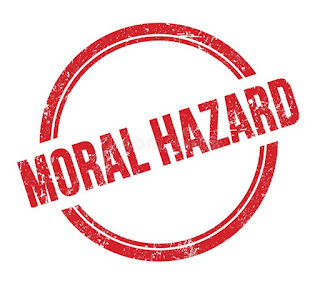Moral Hazard
Moral Hazard
It is a situation where an economic actor has an incentive to increase its exposure to risk because it does not bear the full costs of that risk. For example, when a corporation is insured, it may take on higher risk knowing that its insurance will pay the associated costs.
Moral hazard is very common in the insurance and lending industries but also can exist in employee-employer relationships.
The phrase “moral hazard” originally comes from the insurance world and is based largely on the fact that each party has different information regarding a situation. The information is typically not passed on to the insurance company because it would typically result in either higher premium requirements or the inability to obtain the insurance policy.
Asymmetric information gives the risk-taking party incentive to take even greater risks, knowing that the other party will absorb them. For example, insured individuals may more willingly take additional risks in their activities because the terms of their life insurance policy or health insurance coverage require the insurer to pay for all or some medical care.
This can be further divided into ex ante and ex-post moral hazards.
Ex- ante moral hazard is a change in behavior prior to the outcome of the random event. For example when an insured with a health coverage have no incentives for preventive care.
Ex-post moral hazard refers to the behavior of a party after an event occurs. For example, suppose a person takes out a loan from a bank to start a business. After they receive the credit, they may say their business failed although it was profitable to get a bailout or tax write-off.
Moral hazard is a tricky situation that makes for unfair and sometimes dangerous financial transactions. Insurance and other financial arenas operate best when moral hazard situations don’t arise.
#benewinsurance #insurtech #inclusiveinsurance #insurance #reinsurance #takaful




Comments
Post a Comment
Thank you for making this valuable comment.